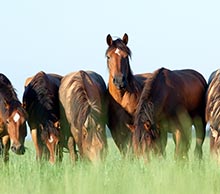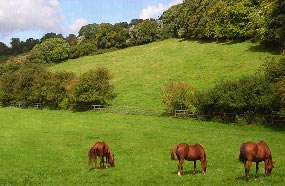
Equine Grass Sickness
Petplan Equine is raising awareness for Equine Grass Sickness which is a rare but predominantly fatal illness in horses. Cases of Grass Sickness occur in every month of the year but most are seen between April and July. Petplan Equine paid out claims for Grass Sickness in each of the 12 months in 2014 totalling just under £37,000 and the majority of claims we received were in June and July.
Petplan Equine's veterinary expert Gil Riley explains the condition, the symptoms and prognosis, and how to prevent Grass Sickness.
What is Grass Sickness?
 Grass Sickness is a disease that can affect any animal at pasture and causes a severe colic. Although much feared, and rightly so, we must recognise that it is not a very common condition. Although the disease is most often seen in the months of May through to September and in animals of 2 to 7 years of age, it can be seen at all times of the year and in all ages of animals, including foals! Most cases are seen after cool, dry spells of weather.
Grass Sickness is a disease that can affect any animal at pasture and causes a severe colic. Although much feared, and rightly so, we must recognise that it is not a very common condition. Although the disease is most often seen in the months of May through to September and in animals of 2 to 7 years of age, it can be seen at all times of the year and in all ages of animals, including foals! Most cases are seen after cool, dry spells of weather.
Despite over 100 years of research the cause of Grass Sickness remains unknown but there is growing scientific evidence to suggest that the disease may occure due to a toxin produced by Clostridium botulinum (a Clostridial bacterium). The bacterium lives in the soil and when it spreads on to the grass it can be eaten by the horse. The current theory is that Grass Sickness occurs when a combination of risk factors triggers the production of bacterial toxins locally in the horse’s intestinal tract which interferes with the nerves in the intestine causing a severe dysfunction and a colic which is almost always fatal.
Forms of Grass Sickness
| Chronic | Acute | Peracute | |
|---|---|---|---|
| Prognosis | Affected horses can sometimes make a recovery as long as the swallowing reflex is not lost due to the toxin. | Fatal even after treatment. | Horse found dead in the field. |
| Symptoms |
|
|
|
| Treatment | With intensive care and pain relief, some cases of Chronic Grass Sickness can recover over a long period. | Many of the horses suffering will undergo colic surgery where a sample of the gut can be taken; on laboratory examination of this sample, the nerves will be seen to have undergone the classic changes caused by the Grass Sickness toxin. |
Prevention
Grass Sickness is often identified with particular fields and even particular areas of a field; for example, one paddock on a farm may have produced several cases over the years whereas the other paddocks may never have had cases. It is new horses introduced to the paddock that are most at risk with those that have grazed it for some time at much less risk, presumably because of having developed an immunity.
- Recent disturbance of the soil can be associated with cases e.g. fields that have recently had drainage work done. Introducing new (usually young) stock on to paddocks that have a history of producing cases of Grass Sickness or paddocks where work has been recently performed should therefore be avoided.
- Grass Sickness is less common in those horses that do not depend solely on grass for their nutrition. Feeding hay at pasture or bringing horses into a stable at night may help to reduce its occurrence.
- Vaccination- Trials are currently ongoing to evaluate whether a vaccination against Clostridium botulinum can help to prevent Grass Sickness. Hopefully before too long one will be available so that all horse owners, and especially those that have had the misfortune of having owned a horse that has succumbed to this horrible disease, can sleep more soundly!
You can find out more about the Equine Grass Sickness vaccine trial and register for it here- http://www.equinegrasssickness.co.uk



